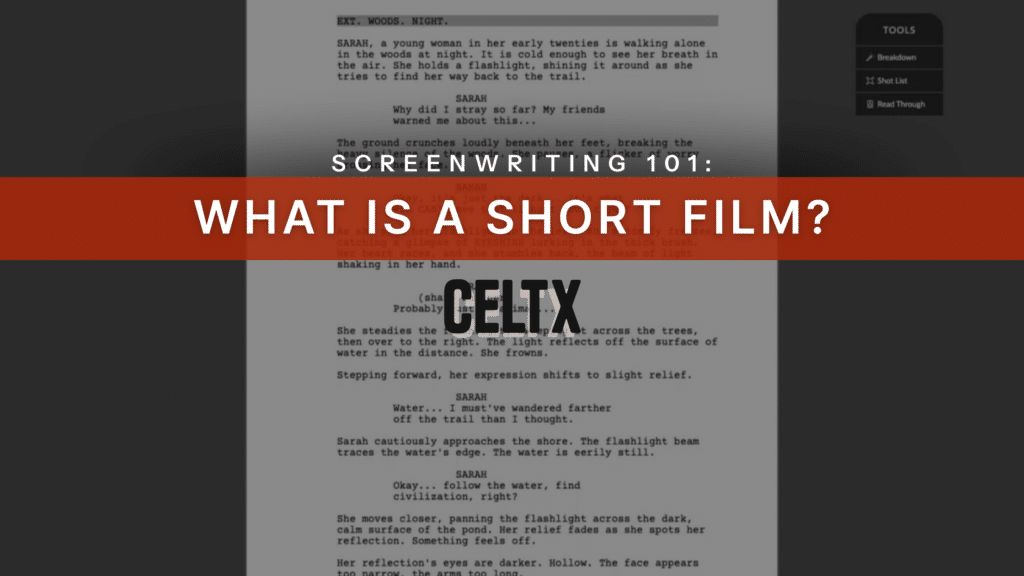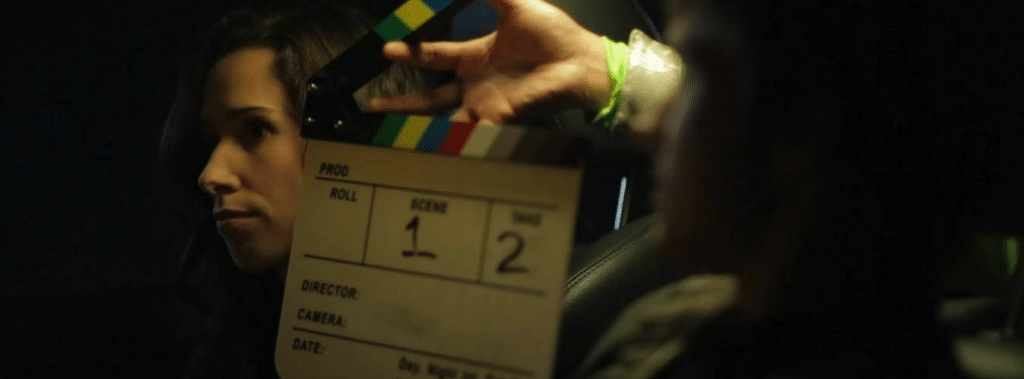
Short films are the most misunderstood format in filmmaking. They’re often treated like practice or a warm-up lap before the ‘real race’ of features, a school assignment, or a stepping stone you rush past on your way to something bigger. But that mindset is exactly why so many short films fall flat.
A short film is its own medium, with its own rules, strengths, and creative power. When done well it can launch careers, win festivals, attract agents, and announce a filmmaker’s voice louder than a microbudget feature ever could.
In today’s blog, we’ll break down what a short film actually is, how it differs from features, what purpose it serves today, common mistakes to avoid, and why mastering short films might be the smartest move you can make as a filmmaker right now.
So, let’s get started!

What Is a Short Film?
A short film is any motion picture that runs shorter than a feature-length film.
But let’s be more specific. Most major organizations define a short film as:
- Under 40 minutes, including credits (Academy Awards)
- Typically, 5-20 minutes for festival planning sweet spots
- Often under 10 minutes for online and modern attention spans
While you can technically make a 35-minute short, most programmers, audiences, and distributors prefer tighter runtimes. Short films truly live and die by momentum.
But length alone doesn’t define a short film. Moreso intent.
So, if you want the detailed explanation, a short film is a single cinematic idea that answers one central question, explores one emotional shift, or delivers one powerful moment, and then gets out.
If a feature film is a novel, a short film is a short story or a poem. Not a summary or a teaser. A complete piece of art.
Write your first short film with Celtx using our guide How to Write a Short Film.
Short Film vs. Feature Film Structure
Okay, so this is where many filmmakers go wrong. They apply feature-film thinking to a short format, and the short collapses under the weight. Here are the key differences between short films and feature films:
1. Smaller Scope, Sharper Stakes
Features explore change over time, whereas shorts explore change in a moment.
A feature might track:
- A character’s transformation over years
- Multiple relationships
- A full rise, fall, and resolution
A short film usually captures:
- A decision
- A realization
- A confrontation
- A single emotional pivot
Think less ‘life story’ and more ‘pressure cooker.’
2. You Don’t Have Time for Setup
Features earn their exposition, but shorts steal it.
In a feature you might spend 20-30 minutes establishing who the character is, what they want, and what’s wrong with their world. But in a short, you need all of that understood in mere seconds.
This is why strong short films rely heavily on:
- Visual storytelling
- Implied backstory
- Archetypal situations
- Immediate conflict
The audience doesn’t need to know everything; just enough!
3. A Compressed Structure
Don’t get me wrong, short films still have structure; they’re not excuses to go completely off the rails. Most successful shorts follow a compressed version of classic storytelling:
- A brief setup
- Escalation
- Turn
- Resolution or revelation
What’s the difference? Well, these beats might happen under five minutes.
Every scene must earn its place, and every line of dialogue must pull weight. There is no room for indulgence.
The Modern Purpose of a Short Film
Historically, short films existed because filmmakers needed a way to experiment. Today, short films exist because, well, they just work! In the modern industry, a short film is one of the most powerful tools a filmmaker can create.
Why? Let’s find out.
1. Short Films are Career Accelerators
Short films are how many filmmakers get signed by agents or managers, enter major festivals like Sundance, TIFF, or Cannes, secure development deals, and get hired for commercials, TV or features.
Executives rarely read unsolicited feature scripts anymore, but they will watch a great 8-minute film because it proves execution of an idea, not just intention.
2. Short Films Showcase Voice
Anyone can imitate structure, but voice, oh that’s much harder. Creating a short film allows you to demonstrate infinite creative skills like:
- Your tonal instincts
- Your sense of humor or darkness (depending on the genre)
- Your visual language
- Your emotional point of view
A good short answers the question “Why should we trust you to tell stories?” which is far more valuable than budget size or technical perfection.
3. Short Films are Built for the Current Media Landscape
Shorts are truly thriving online through Vimeo Staff Picks, YouTube premieres, social media, and branded content crossovers. They’re extremely shareable, programmable, and most importantly, digestible for a wide audience.
In a world of shrinking attention spans, short films now feel native, rather than a compromise to other mediums.
Short Film Examples
Some of the most exciting filmmakers working today broke through with short films. Here are four notable examples that we can learn from:
Whiplash (2013) | Damien Chazelle
Before it became an Oscar-winning feature, Whiplash existed as a short film that did one thing exceptionally well: it captured obsession under pressure. The short zeroes in on a single rehearsal, using intensity and rhythm to communicate character faster than pages of exposition ever could.
It worked because it felt complete, even while hinting at a larger world.
Lights Out (2013) | David F. Sandberg
Sitting at just 3 minutes long, Lights Out is a masterclass in simplicity with one idea, one rule, and one escalating fear. The short went viral because it understood exactly what short films do best: deliver a clean, unforgettable experience in minutes.
Its success proves that concept matters more than budget, and that clarity beats complexity every time.
Hair Love (2019) | Matthew A. Cherry
Hair Love demonstrates the emotional power of short films. In just a few minutes, it established character, family dynamics, and theme with warmth and precision.
The film resonated globally because it told a universal story through a specific lens, reminding filmmakers that emotional honesty travels farther than spectacle.
Thunder Road (2016) | Jim Cummings
Thunder Road is raw, awkward, funny, and devastating all at once. Built around a single extended scene, the short showcases voice louder than production value. It feels dangerous and deeply personal, which is exactly why it broke through. This is proof that originality and commitment can outweigh polish.
Dreams Like Paper Boats (2024) | Samuel Suffren
Dreams Like Paper Boats is a quiet, poetic short that explores distance, memory, and emotional survival. Centered on a father and daughter in Haiti clinging to a cassette tape sent by a mother who emigrated years earlier, the film uses restraint as its greatest strength.
Rather than dramatizing separation, it lets absence speak, proving how powerful short films can be when they trust stillness, implication, and human detail.

While all widely different, each of these shorts share this: they’re all one idea, one tone, and one emotional punch that don’t hedge, apologize, and end exactly when they should.
Common Mistakes to Avoid
Unfortunately, short films fail for predictable reasons. Not because the filmmaker lacks talent, but because they misunderstand the format.
Let’s run through the most common traps that weaken otherwise strong ideas.
1. Making a Short Feel Like a Feature’s First Act
This is the most widespread mistake in short filmmaking.
A short film shouldn’t be a teaser for something bigger. When your film ends and the audience feels like the story just stopped dead instead of concluded, it signals structural confusion. Short films must resolve their central dramatic question, even if they leave emotional or thematic ambiguity.
If your short requires a pitch afterwards, the film isn’t doing the job on its own.
2. Trying to Tell Too Much Story
Short films collapse under narrative ambition. Multiple locations, timelines, subplots, and character arcs dilute focus and reduce impact. But compression isn’t about cramming in more, it’s about choosing less and executing it better.
As we’ve already explored, the strongest shorts revolve around one situation, central conflict, or meaningful shift. Anything else is usually excess.
3. Overexplaining Through Dialogue
Okay, I know exposition is super tempting when time is limited, but heavy dialogue often slows a short film down instead of clarifying it.
Short films thrive on implication through visual cues, behaviour and context which should do most of the storytelling work. When characters explain their relationships, emotions, or backstories out loud, the film loses confidence.
If a line exists only to inform the audience, it probably doesn’t belong.
4. Starting Too Early/Ending Too Late
Many shorts waste precious minutes on setup and linger past their emotional endpoint. You really don’t need to show things like:
- Characters waking up
- Traveling to the location
- Explaining the rules of the world
The trick is to start as close to the turning point as possible and end when the emotional statement has been made, not after you’ve tied every loose end.
5. Style over Substance
Cinematic images are valuable, but only in service of meaning. Beautiful shots, long takes, and impressive camera moves can’t compensate for a weak story core. Festival audiences and programmers respond to intention and clarity far more than technical flash.
A simple film with something to say will always outperform a gorgeous film that says nothing.

6. Avoiding Emotional Commitment
Many short films play it safe, hinting at emotion instead of embracing it. They soften endings to avoid risk and aim for ‘interesting’ rather than impactful.
Great shorts commit to making bold emotional choices and trusting the audience to follow, even if it’s uncomfortable. While ambiguity is powerful, indecision is the complete opposite.
7. Chasing Trends Instead of Voice
It’s easy to spot a short film designed to imitate what’s currently winning festivals. The problem is that by the time your film is finished, that trend has already moved on.
Short films work best when they feel personal, specific, and honest. Your unique perspective is more valuable than your ability to replicate someone else’s success. Essentially, if your short could have been made by anyone, it won’t be remembered.
FAQ About Short Films
Most successful short films run between 5 and 15 minutes. Festival programmers often favor shorts under 10 minutes, but quality always trumps runtime.
Absolutely. Short film scripts:
– Focus on one central moment
– Start as late as possible
– End as soon as the emotional point is made
– Rely heavily on subtext and visuals
– Think less about plot mechanics and more about impact.
Check out Celtx’s Short Film Format Guide to get started writing your first short film, complete with a FREE TEMPLATE!
There’s no single “best,” but great short films tend to:
– Commit to a strong point of view
– Embrace limitation as strength
– Leave the audience changed, unsettled, or emotionally charged
If you remember it days later, it worked.
Conclusion
Short films aren’t the minor leagues of filmmaking, but the sharpest test of a storyteller’s instincts.
In a short film, you can’t hide behind runtime, spectacle, or excess. You have to know exactly what you’re saying and say it with confidence. That’s why the short film remains one of the most powerful creative calling cards a filmmaker can make. If you can move someone in under ten minutes, you can move them at any length. And that ability to command attention, emotion, and meaning is the real goal of filmmaking.
Focus on your story, not your formatting.
Let Celtx’s Script Editor automatically apply all industry rules while you focus on the story.
Up Next:

How to Write a Short Film (Top 9 Tips from a Script Writer)
Short films demand clarity, focus, and strong storytelling in a limited runtime. This guide breaks down how to develop an idea, structure a short script, and make every scene count.
